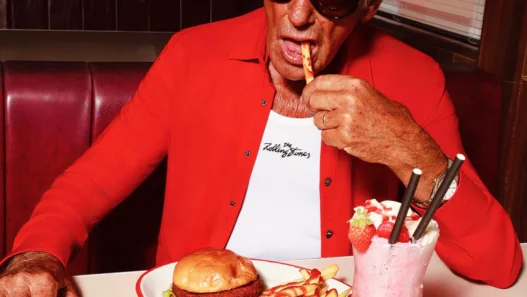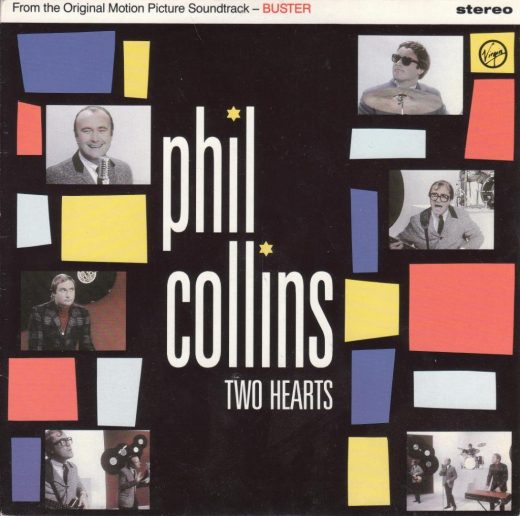According to one of our preferred musical sources:
Phil Collins didn’t want to do the music for his movie Buster. Collins, who hadn’t acted in a feature film since his child-actor days in the ’60s, played the lead in Buster, the British biopic about one of the guys behind the Great Train Robbery. The people at MGM were presumably not too excited to learn that this pop star they’d cast had decided that he wanted to focus on his acting and that he’d be handing off soundtrack responsibilities to someone else. But Collins reconsidered. He ended up recording a bunch of songs for Buster, and those songs presumably made a whole lot more money than the film itself. Buster was a tremendous flop, especially in the US, but its soundtrack still spun off two #1 hits.
Buster was a ’60s period piece, and Collins wanted to make sure that the music fit with that time. Collins was an incorrigible nostalgist cornball, and the urge to make ’60s-type music was one of the prime reasons that he ended up recording songs for the movie. For the first of those Buster hits, Collins covered the Mindbenders’ 1965 hit “A Groovy Kind Of Love.” For the second, Collins merely did his level best to evoke the sound of the early ’60s.
Like so many other boomer hitmakers in the ’80s, Collins was in love with the sound of Motown. The second of those big Buster hits was Collins’ attempt to make something that Motown might’ve released at its peak. To properly evoke that feeling, Collins worked with the great Motown songwriter Lamont Dozier, who’d been one third of the unstoppable Holland-Dozier-Holland team and who’d thus been partially responsible for an absurd number of Supremes and Four Tops hits. In interviews, Collins said that it was a dream to work with a legend like Dozier. So Phil Collins really tried. Unfortunately, “Two Hearts” was the best he could do.
Before Collins worked with Lamont Dozier, before he even met Dozier, he had a hit with one of the songs that Dozier had co-written. Collins first reached the US top 10 in 1982, when his version of the Supremes’ 1966 classic “You Can’t Hurry Love” peaked at #10. Collins’ cover of “You Can’t Hurry Love” takes no liberties with the original. Instead, it’s a note-for-note recreation, but with a singer who’s nowhere near as good as Diana Ross and with an ’80s sheen on the production that was thankfully missing from the original. Collins attacked the song like an overeager honors student, and I guess that approach worked out for him. (Collins’ version is a 5.)
A while later, the Atlantic Records exec Tony Mandich took Dozier to a Collins show, and he introduced Dozier to Collins. In Fred Bronson’s Billboard Book Of No. 1 Hits, Dozier describes the encounter: “Phil turned around and literally ran and jumped on me, put his arms around me — which took me by surprise, because Tony hadn’t told me anything about Phil liking my music.” You would think that Lamont Dozier would’ve known that Collins had a hit with “You Can’t Hurry Love,” but by that point, a lot of people were covering those Holland-Dozier-Holland singles. Maybe Dozier just couldn’t keep up.
Dozier wasn’t exactly in the pop mainstream in 1988. He and the two Holland brothers had split from Motown in 1968, and they’d had limited success launching their own new labels. The trio started Hot Wax Records, which had a #1 hit in 1971 with the Honey Cone’s “Want Ads,” but H-D-H didn’t write that one. Hot Wax and Invictus, the other label that they started, never truly caught on. Dozier broke away from the Holland brothers in 1973, and he had a run as a solo artist. (Dozier’s highest-charting single, 1974’s “Trying To Hold On To My Woman,” peaked at #15.) Mostly, though, Dozier’s post-Motown career was defined by legal battles over past royalties, not by new hits.
Still, those Holland-Dozier-Holland songs never left the general consciousness. Without having to write any new music, Dozier had his name on two #1 hits in the late ’80s. In 1987, Kim Wilde got to #1 with her version of the Supremes’ “You Keep Me Hangin’ On.” A year later, Steve Winwood topped the Hot 100 with “Roll With It,” a song that mirrored Jr. Walker & The All Stars’ H-D-H-written 1966 single “(I’m A) Road Runner” so closely that the Hollands and Dozier got retroactive songwriting credits.
In any case, Phil Collins’ whole overbearing fanboy act got Dozier a chance to work on some new music. Dozier and Collins became acquaintances after that backstage encounter, and Collins eventually asked Dozier if he had any songs for Eric Clapton. Collins was producing his friend Clapton’s 1986 album August, and Dozier brought a couple of songs over to the studio. Clapton and Collins started recording them right away. Two Dozier-written songs, “Run” and “Hung Up On Your Love,” appeared on August, though neither one became a single. They’re both pretty bad.
A year later, Collins had the idea for Dozier to do the whole Buster soundtrack, and he specifically asked Dozier to try writing some Motown-style songs. Dozier came up with some tracks, and he flew to the Buster set in Acapulco to play them for Collins. One of those songs was “Two Hearts,” and Collins liked it so much that he decided that he would do the Buster music after all. Collins recorded the song, and he must’ve changed some things, since he and Dozier both have writing credits. Collins and Dozier also teamed up to produce the song.
In “Two Hearts,” you can hear what Phil Collins clearly wanted to make, and you can hear exactly how he fell short. “Two Hearts” is just as doomed as virtually every other Motown pastiche of the ’80s. The elements are all there: The breezy four-four beat, the sprightly string arrangement, the sticky hook. But they don’t add up to the brilliance of the ’60s Supremes hits that Collins clearly wanted so badly to emulate. The ’80s production style, which Collins helped invent, is just singularly incapable of recapturing that Motown magic. Even working with an actual Motown genius, Collins still made something that sounded more like a sitcom theme than a timeless pop classic.
Dozier and Collins wrote “Two Hearts” specifically for Collins’ Buster character. It’s a song about Buster Edwards being so in love with his wife that he’d leave Acapulco and let himself get arrested just so he could be around his family. The “Two Hearts” lyrics don’t really get into the specifics, which might’ve been interesting. Instead, Collins simply sings some Hallmark-card stuff about the power of love: “Two hearts living in just one mind/ Beating together till the end of time.” I have questions. Why are they both in one mind? Wouldn’t it make more sense if two minds shared one heart? And for that matter, since when does your heart beat in your mind? There’s a whole unintended body-horror thing going on there. If your heart is actually inside your brain, you’ve got problems.
The video does not answer any of those questions. Instead, Collins worked with Jim Yukich, a past collaborator who would go on to direct the 1994 Double Dragon movie, to make something deeply familiar. In the clip, a whole band of Phil Collinses plays a ’60s-style TV performance. I don’t know if the Beatlemaniacs would’ve gone wild for an entire band of middle-aged Phil Collins clones, but an actual Beatle had already gotten there first anyway. Paul McCartney had played 10 different roles in his own video for the 1980 chart-topper “Coming Up.” So the “Two Hearts” video is several different layers of pastiche and nostalgia operating at once.
Collins and Dozier apparently liked working with each other, and they kept on doing it. The Buster soundtrack has another Collins/Dozier collab called “Big Noise,” and it also has “Loco In Acapulco,” a track from Dozier’s old collaborators the Four Tops. Collins and Dozier co-wrote and co-produced “Loco In Acapulco.” The song wasn’t released as a single in the US, but it went top-10 in the UK.
round the same time that “Two Hearts” hit #1, the song also got Collins and Dozier nominated for the Best Original Song Oscar. Collins didn’t perform “Two Hearts” at the Oscars — they didn’t do performances of the nominated songs that year — and “Two Hearts” lost to “Let The River Run,” the Carly Simon song from the Working Girl opening credits. (“Let The River Run” peaked at #49.) Somehow, this was the only nomination for Buster. Collins would finally win his Oscar a decade later.
At least right now, “Two Hearts” is the last #1 hit for Lamont Dozier. (Thanks to the way sampling works, I think there’s a good chance he’ll get another writing credit on a #1 hit.) Dozier worked with Collins again on Dozier’s own 1991 album Inside Seduction. Dozier has kept working since then, and he put out an album called Reimagination in 2018. Today, Dozier is 79, which seems young for someone who started writing hits almost 60 years ago. “Two Hearts” was a nice little career end-note for the man, but it’s not exactly one of his defining works. It’s not even a defining work for Phil Collins, but that’s OK. Collins will appear in this column again.
GRADE: 3/10 Courtesy of https://www.stereogum.com/2151063/the-number-ones-phil-collins-two-hearts/columns/the-number-ones/


















